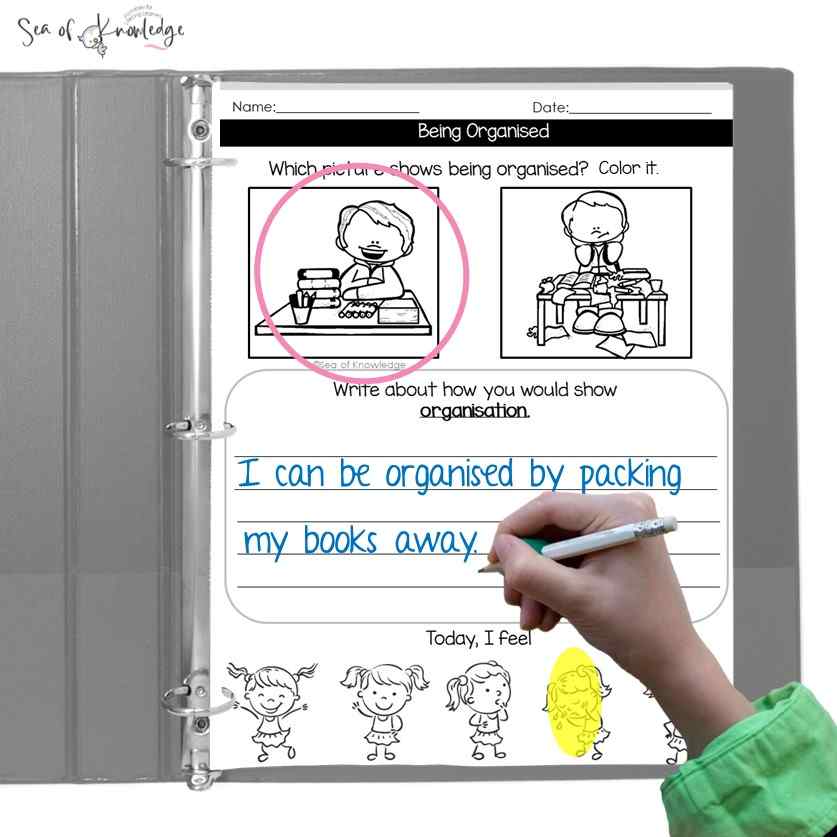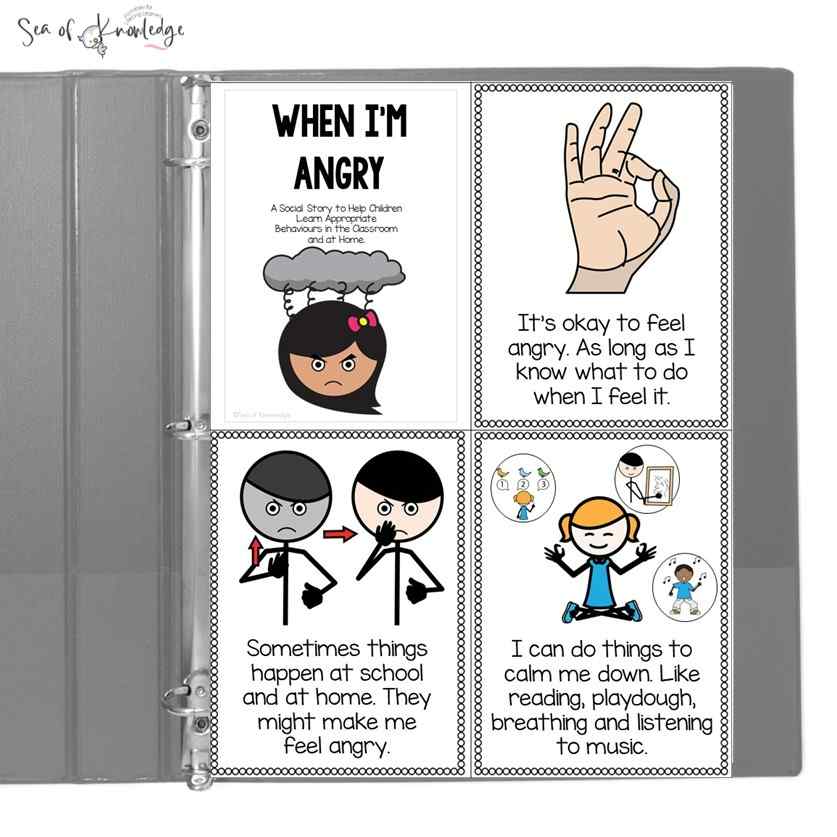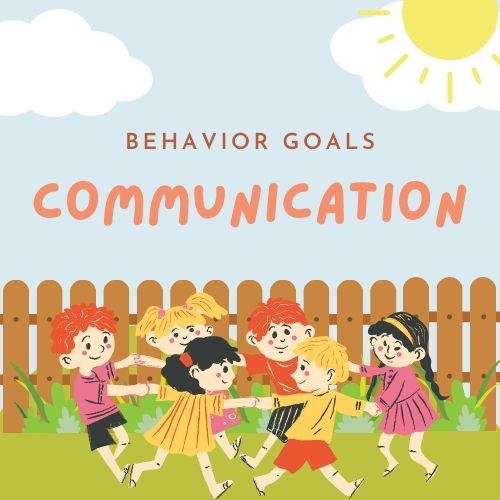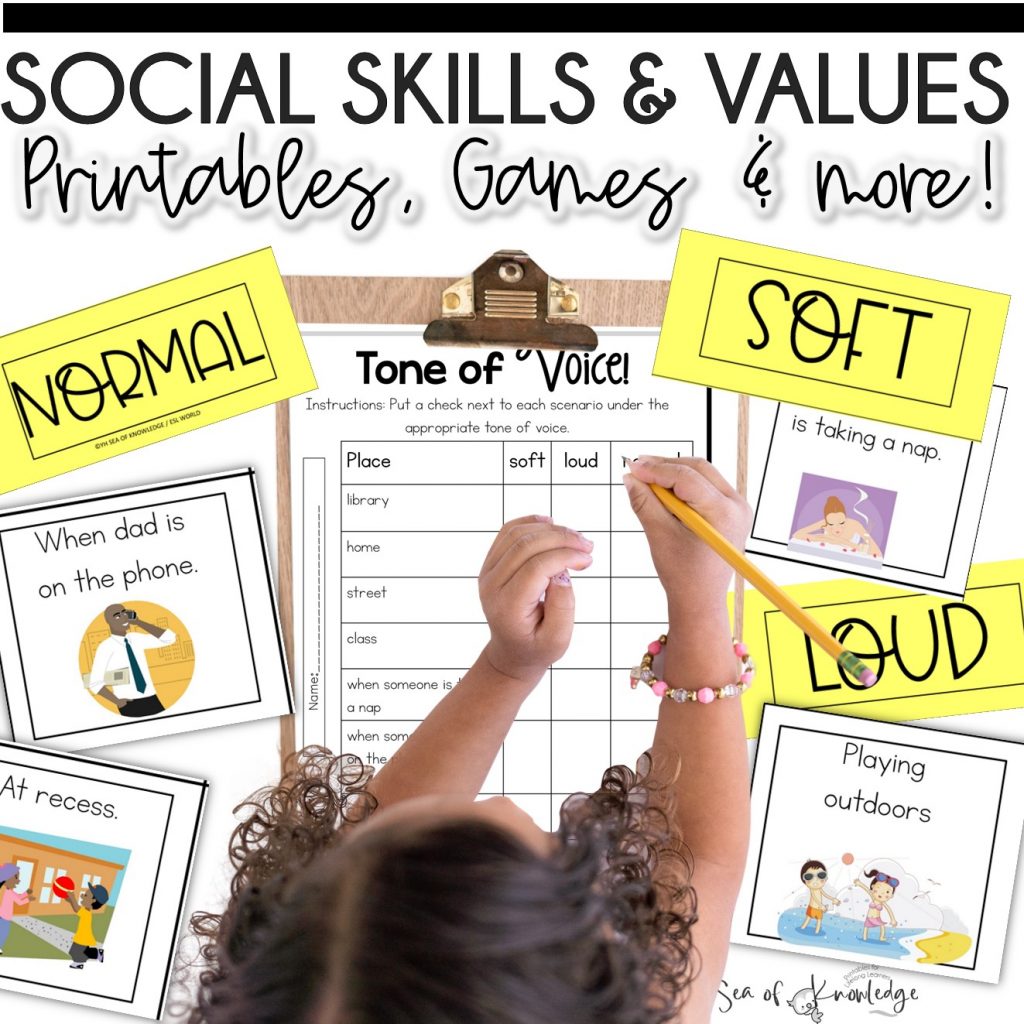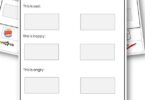As a teacher, one of your primary responsibilities is to help your students achieve their academic and social potential. This post will outline some behavior goals for students with autism that you could target.
Previosuly I’ve shared some goals for social skills you could target, these specific goals target behavior goals.
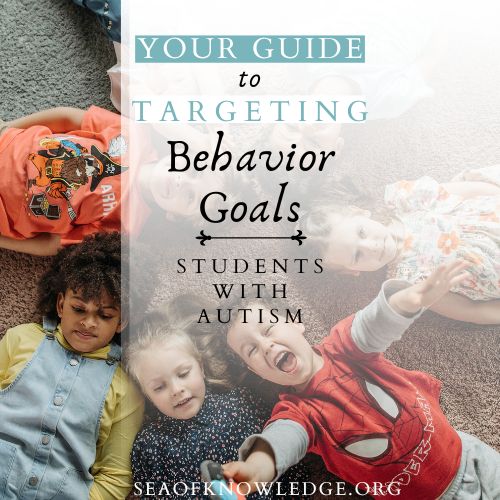
These goals can be used in an IEP meeting in a school district or with the IEP team.
Choose specific goals for the child’s progress and the child’s behavior. These goals would also benefit special education teachers.
Autism Spectrum Disorder
Children with this disorder can benefit from special education services and an individualized education program to cater for their goals.
It works on the individual student rather than the whole class. And usually the education program is specific to those goals.
You could also target from social skills goals to further this plan. The long-term goal is to improve behavior and learning.
What are some behavioral goals you could target?
Decision Making Goals
Decision making is super important in any classroom and for any student.
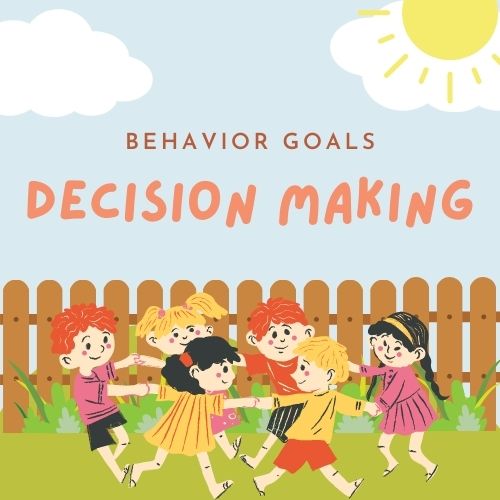
Having the confidence to make decisions would make anyone able to target what they want to do in future and become well rounded adults.
A good educational program targets specific needs and it is a big help in transforming student’s behavior.
A school psychologist can help with special needs as well as recommend physical therapy too.
Decision-making skills are essential for students with autism spectrum disorder (ASD) to become more independent and self-sufficient.
Here are some examples of decision-making goals for individuals with autism:
Identify and prioritize personal goals: This goal could involve working with a therapist or counselor to identify and prioritize short-term and long-term personal goals.
Recognize and evaluate consequences: This goal could involve learning to recognize and evaluate the potential consequences of various decisions, both positive and negative.
Develop problem-solving skills: This goal could involve learning to identify problems, brainstorm potential solutions, and evaluate the effectiveness of different solutions.
In a classroom setting, it is usually based on the teacher observation to see the next step in the target behavior.
There might be some developmental delays and some needed behavioral intervention, but it’s important to recognise them and use replacement behaviors instead.
Visual cues would help students and kids with behavior support. I love using printable social skills worksheets and games to help them along with this.
Organization goals
This skill is also super important for students with autism. Especially in a general education setting, adding this to measurable IEP goals is essential.
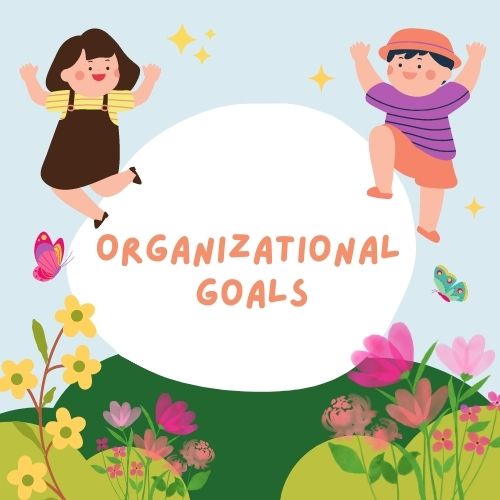
It also reduces the instances of disruptive behavior and enhances communication skills.
Develop a consistent routine: This goal could involve working with the student to establish a consistent daily routine that includes time for academic work, recreation, and self-care.
Improve time management skills: This goal could involve developing strategies for managing time effectively, such as creating a schedule, using a timer, and breaking down tasks into manageable chunks.
Increase independence in organizing school materials: This goal could involve developing strategies for organizing school materials independently, such as using a planner, color-coding folders, and using visual supports.
Improve positive behaviors by adding these skills to a written document or an individualized education plan.
A child’s education is dependent upon complete tasks, language skills and younger students nonverbal communication too.
There are some measurable goals you can add but need to vary depending on the development stages of your students.
The ultimate goal is to have an appropriate reinforcement system.
More organizational goals below you can add.
Increase independence in organizing school materials: This goal could involve developing strategies for organizing school materials independently, such as using a planner, color-coding folders, and using visual supports.
Improve task initiation skills: This goal could involve developing strategies for initiating tasks independently, such as using a task list, setting goals, and breaking tasks down into smaller steps.
Improve working memory: This goal could involve developing strategies for improving working memory, such as using mnemonic devices, repeating information aloud, and practicing recall exercises.
Problem Solving
Identifying specific behavior goals in student’s needs are essential and these problem solving goals help target individual needs.
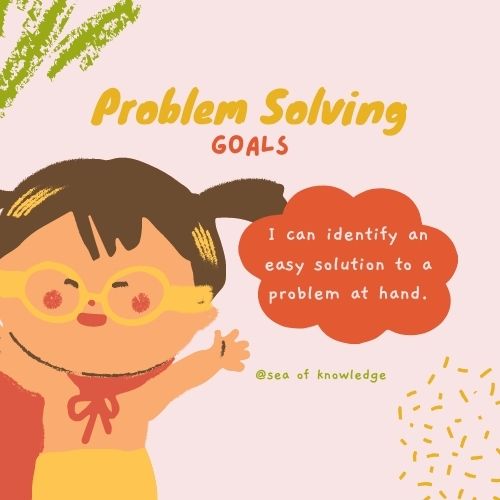
Identify and define problems: This goal could involve learning to identify and define problems that need to be solved, such as academic or social challenges.
Generate multiple solutions: This goal could involve learning to generate multiple solutions to a problem, such as brainstorming different approaches or strategies.
Evaluate the effectiveness of solutions: This goal could involve learning to evaluate the potential effectiveness of different solutions, such as considering the benefits and drawbacks of each option.
Choose the best solution: This goal could involve learning to choose the best solution to a problem, based on the individual’s goals and needs.
Implement and monitor solutions: This goal could involve learning to implement and monitor the effectiveness of chosen solutions, such as keeping track of progress and making adjustments as needed.
Develop critical thinking skills: This goal could involve learning to analyze information, make connections, and draw conclusions based on evidence.
Increase independence in problem-solving: This goal could involve developing strategies for problem-solving independently, such as using checklists or breaking down problems into manageable steps.
Responsibility
You can make small modifications for younger or older students depending on their functional skills and behavioral disorders.

Develop self-awareness: This goal could involve learning to recognize personal strengths and challenges, and identifying strategies for self-improvement.
Increase self-reliance: This goal could involve developing strategies for completing tasks independently, such as following a schedule, organizing materials, and seeking assistance when necessary.
Increase accountability: This goal could involve developing strategies for accepting responsibility for personal actions and decisions, such as acknowledging mistakes and making amends when necessary.
Develop decision-making skills: This goal could involve developing strategies for making informed decisions, such as gathering information, considering alternatives, and weighing pros and cons.
Increase self-advocacy: This goal could involve developing strategies for advocating for personal needs and preferences, such as requesting accommodations or communicating with peers and teachers.
Develop time-management skills: This goal could involve developing strategies for managing time effectively, such as prioritizing tasks, creating a schedule, and setting goals.
Routines
Routines are essential when you are trying to get to a common goal.
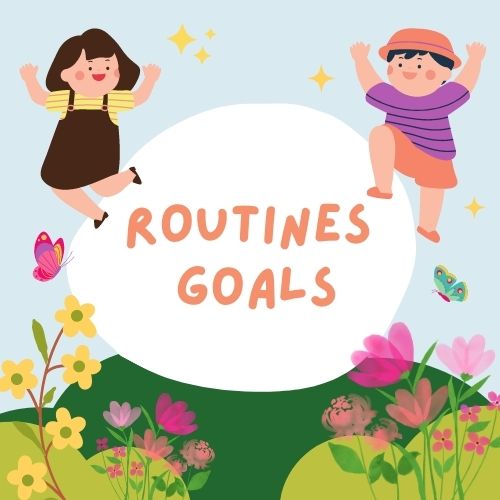
Students will learn how to manage their own routines when you help them develop these day in and day out.
Establish a consistent daily routine: This goal could involve developing a structured schedule for daily activities, such as waking up, getting dressed, eating meals, and engaging in recreational activities.
Increase independence in daily routines: This goal could involve learning to complete routine tasks independently, such as brushing teeth, washing hands, and using the bathroom.
Improve transitions between activities: This goal could involve developing strategies for transitioning smoothly between different activities, such as using visual schedules, timers, or cues.
Improve flexibility in routine: This goal could involve learning to adapt to changes in routine, such as unexpected events, changes in schedule, or disruptions in the environment.
Develop skills for following multi-step routines: This goal could involve learning to break down complex tasks into smaller steps, use checklists, and practice following multi-step directions.
Improve communication during routines: This goal could involve developing strategies for communicating needs and preferences during routine activities, such as using visual supports or communication devices.
Increase participation in structured activities: This goal could involve developing strategies for participating in structured activities, such as classroom routines, group games, or team sports.
These goals can be tweaked and changed of course depending on how you want to use them with your students.
It is always best to lead the students spending on where they are in the process.
Self-Advocacy
This is an essential goal to target. This helps students develop autonomy, independence and more!
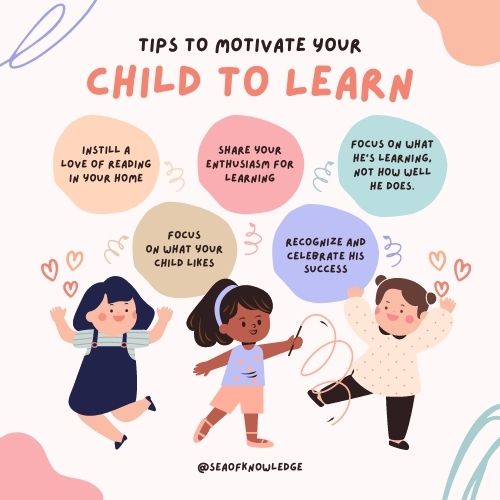
Self-advocacy goals for students with autism can vary depending on their individual needs and strengths. However, some common goals that can help empower students with autism to become better self-advocates include:
Understanding their diagnosis: Helping students understand their diagnosis and how it affects them can help them become more aware of their strengths and weaknesses, and empower them to communicate their needs effectively.
Developing self-awareness: Encouraging students to develop self-awareness about their strengths, weaknesses, preferences, and learning styles can help them become better self-advocates.
Developing communication skills: Helping students develop communication skills, including verbal and nonverbal communication, can enable them to express their needs and preferences more effectively.
Building self-esteem and self-confidence: Encouraging students to focus on their strengths, and celebrating their accomplishments can help build their self-esteem and self-confidence, which can in turn help them advocate for themselves.
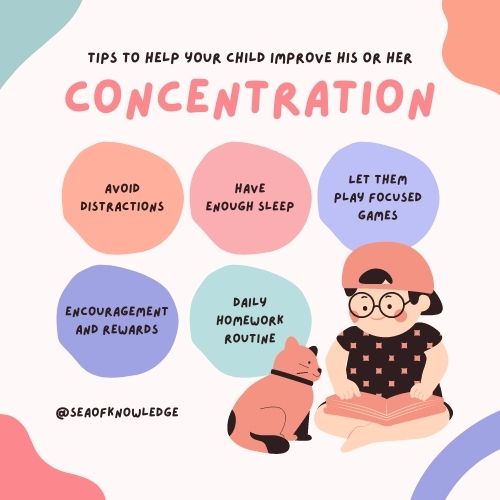
Setting goals and priorities: Helping students set goals and priorities can enable them to identify what they want to achieve, and develop a plan to achieve it.
Practicing self-advocacy skills: Providing opportunities for students to practice self-advocacy skills, such as asking for accommodations, can help them become more comfortable with advocating for themselves.
Seeking support: Encouraging students to seek support when they need it, and helping them identify appropriate sources of support, can empower them to navigate challenges and become better self-advocates.
List of behavior IEP goals
I’ve outlined so many social skills for IEP goals in this post. These are great and work well here too.
Work Completion
Breaking tasks down into smaller steps: Many students with autism benefit from breaking down tasks into smaller, more manageable steps. Teachers and caregivers can work with students to identify the steps needed to complete a task and provide support and guidance along the way.
Improving focus and attention: Many students with autism struggle with maintaining focus and attention. Teachers and caregivers can provide support by breaking tasks down into shorter chunks, providing frequent breaks, and using visual supports to help students stay on task.
Increasing motivation: Students with autism may be more motivated to complete work if they feel invested in it. Teachers and caregivers can work with students to identify topics and activities that they are interested in, and use these as a way to increase motivation and engagement.
Providing positive reinforcement, organisational skills and structured activities also help develop work completion goals.
Communication Goals
Self-advocacy goals for students with autism can vary depending on their individual needs and strengths.
However, some common goals that can help empower students with autism to become better self-advocates include:
Understanding their diagnosis: Helping students understand their diagnosis and how it affects them can help them become more aware of their strengths and weaknesses, and empower them to communicate their needs effectively.
Developing self-awareness: Encouraging students to develop self-awareness about their strengths, weaknesses, preferences, and learning styles can help them become better self-advocates.
Developing communication skills: Helping students develop communication skills, including verbal and nonverbal communication, can enable them to express their needs and preferences more effectively.
Building self-esteem and self-confidence: Encouraging students to focus on their strengths, and celebrating their accomplishments can help build their self-esteem and self-confidence, which can in turn help them advocate for themselves.
Setting goals and priorities: Helping students set goals and priorities can enable them to identify what they want to achieve, and develop a plan to achieve it.
Practicing self-advocacy skills: Providing opportunities for students to practice self-advocacy skills, such as asking for accommodations, can help them become more comfortable with advocating for themselves.
Seeking support: Encouraging students to seek support when they need it, this is essential in each category here too!
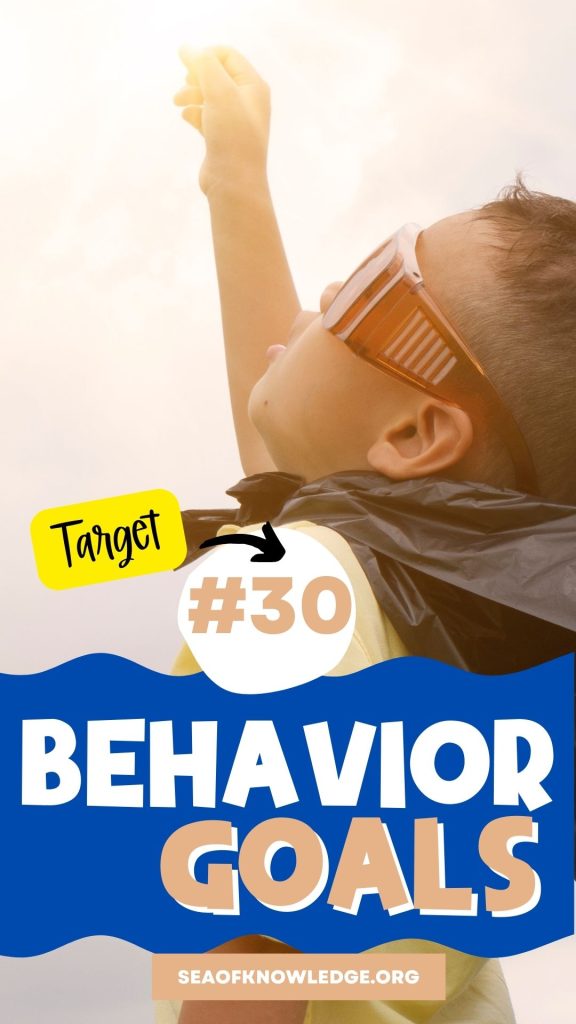
In conclusion, remember that behavioral goals should be tailored to the individual needs and abilities of the student and written using the SMART format (specific, measurable, achievable, relevant, and time-bound).
IEP goals are important for helping students with disabilities reach their full potential and succeed in school.
This includes supporting students with autism spectrum disorder (ASD) who may struggle with social and behavioral challenges in the classroom.
One effective way to support students with ASD is to write behavior goals that are specific, measurable, achievable, relevant, and time-bound (SMART).

